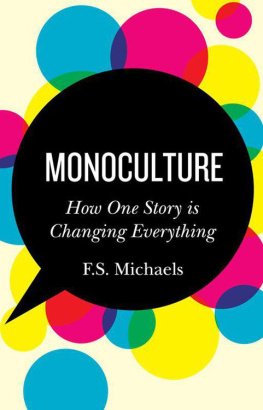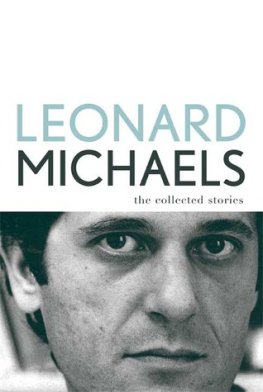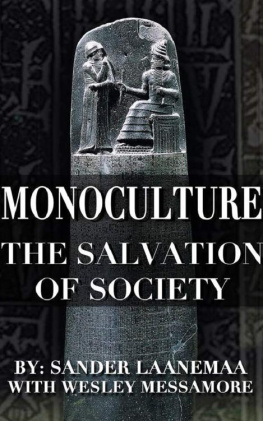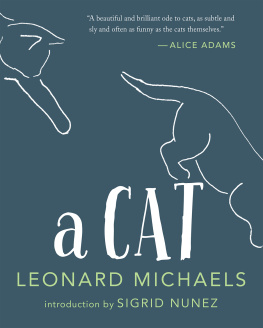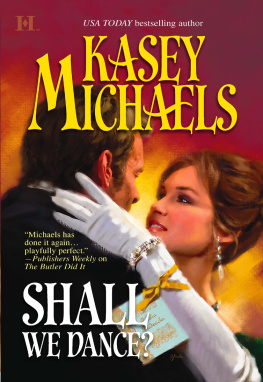F. S. Michaels - Monoculture: How One Story Is Changing Everything
Here you can read online F. S. Michaels - Monoculture: How One Story Is Changing Everything full text of the book (entire story) in english for free. Download pdf and epub, get meaning, cover and reviews about this ebook. year: 2011, publisher: Red Clover Press, genre: Politics. Description of the work, (preface) as well as reviews are available. Best literature library LitArk.com created for fans of good reading and offers a wide selection of genres:
Romance novel
Science fiction
Adventure
Detective
Science
History
Home and family
Prose
Art
Politics
Computer
Non-fiction
Religion
Business
Children
Humor
Choose a favorite category and find really read worthwhile books. Enjoy immersion in the world of imagination, feel the emotions of the characters or learn something new for yourself, make an fascinating discovery.
- Book:Monoculture: How One Story Is Changing Everything
- Author:
- Publisher:Red Clover Press
- Genre:
- Year:2011
- Rating:4 / 5
- Favourites:Add to favourites
- Your mark:
- 80
- 1
- 2
- 3
- 4
- 5
Monoculture: How One Story Is Changing Everything: summary, description and annotation
We offer to read an annotation, description, summary or preface (depends on what the author of the book "Monoculture: How One Story Is Changing Everything" wrote himself). If you haven't found the necessary information about the book — write in the comments, we will try to find it.
Monoculture: How One Story Is Changing Everything — read online for free the complete book (whole text) full work
Below is the text of the book, divided by pages. System saving the place of the last page read, allows you to conveniently read the book "Monoculture: How One Story Is Changing Everything" online for free, without having to search again every time where you left off. Put a bookmark, and you can go to the page where you finished reading at any time.
Font size:
Interval:
Bookmark:
How One Story is Changing Everything
F.S. Michaels
It is easy to forget how mysterious and mighty stories are. They do their work in silence, invisibly. They work with all the internal materials of the mind and self. They become part of you while changing you. Beware the stories you read or tell; subtly, at night, beneath the waters of consciousness, they are altering your world.
BEN OKRI
There is no such thing as just a story. A story is always charged with meaning...And we can be sure that if we know a story well enough to tell it, it carries meaning for us.
ROBERT FULFORD
THE HISTORY OF HOW we think and act, said twentieth-century philosopher Isaiah Berlin, is, for the most part, a history of dominant ideas. Some subject rises to the top of our awareness, grabs hold of our imagination for a generation or two, and shapes our entire lives. If you look at any civilization, Berlin said, you will find a particular pattern of life that shows up again and again, that rules the age. Because of that pattern, certain ideas become popular and others fall out of favor. If you can isolate the governing pattern that a culture obeys, he believed, you can explain and understand the world that shapes how people think, feel and act at a distinct time in history.
The governing pattern that a culture obeys is a master story one narrative in society that takes over the others, shrinking diversity and forming a monoculture. When youre inside a master story at a particular time in history, you tend to accept its definition of reality. You unconsciously believe and act on certain things, and disbelieve and fail to act on other things. Thats the power of the monoculture; its able to direct us without us knowing too much about it.
Over time, the monoculture evolves into a nearly invisible foundation that structures and shapes our lives, giving us our sense of how the world works. It shapes our ideas about whats normal and what we can expect from life. It channels our lives in a certain direction, setting out strict boundaries that we unconsciously learn to live inside. It teaches us to fear and distrust other stories; other stories challenge the monoculture simply by existing, by representing alternate possibilities.
As a result, learning to see the monoculture can leave us feeling threatened and anxious because the process exposes our foundations, outlines the why of why we live the way we do. Still, if we fail to understand how the monoculture shapes our lives and our world, were at risk of making decisions day after day without ever really understanding how our choices are being predetermined, without understanding how the monoculture even shapes what we think our options are. Without a clear understanding of the monoculture, its hard to understand the trajectory of your own life. But once you know what shared beliefs and assumptions make up the governing pattern at this point in history, you can discover the consequences of the monoculture and decide if thats how you really want to live.
Monocultures and their master stories rise and fall with the times. By the seventeenth century, for example, the master story revolved around science, machines and mathematics. Developments in fields like biology, anatomy, physics, chemistry and astronomy were early harbingers of modern science. People began to believe that the nature of the world could be discovered through mathematics, that physical laws directed the behavior of all bodies, and that living creatures could be systematically catalogued in relation to one another. Life was understood as a series of questions with knowable answers, and the world became methodical and precise. A scientific monoculture was created.
That scientific monoculture was radically different from the religious monoculture that preceded it. If you had lived in sixteenth century Europe, a hundred years earlier, you would almost certainly have understood your life through the master story of religion and superstition. People lived surrounded by angels and demons. When Galileo contradicted the teachings of the Roman Catholic Church by claiming that the sun and not the Earth was at the center of the solar system, he was accused of heresy and sentenced to house arrest for the rest of his life. Excommunication from the church and the damning of your eternal soul was a real threat, and you could literally pay for your sins to guarantee yourself a short stay in purgatory. Religion was the zeitgeist, the spirit of the age.
A monoculture doesnt mean that everyone believes exactly the same thing or acts in exactly the same way, but that we end up sharing key beliefs and assumptions that direct our lives. Because a monoculture is mostly left unarticulated until it has been displaced years later, we learn its boundaries by trial and error. We somehow come to know how the master story goes, though no one tells us exactly what the story is or what its rules are. We develop a strong sense of whats expected of us at work, and in our families and communities even if we sometimes choose not to meet those expectations. We usually dont ask ourselves where those expectations came from in the first place. They just exist or they do until we find ourselves wishing things were different somehow, though we cant say exactly what we would change, or how.
Monocultures, though overwhelmingly persuasive and pervasive, arent inescapable. In the end, the human experience always diverges from the monoculture and its master story, because our humanity is never as one-dimensional as the master story says it is. The human experience is always wider and deeper than a single narrative, and over time, we become hungry for something the monoculture isnt speaking to and isnt giving us cant give us. Once you know what the monoculture looks like, you can decide whether it serves a useful purpose in your life, or whether you want to transcend it and live in a wider spectrum of human values instead to know it so you can leave it behind.
In our time, in the early decades of the twenty-first century, the monoculture isnt about science, machines and mathematics, or about religion and superstition. In our time, the monoculture is economic. Because of the rise of the economic story, six areas of your world are changing or have already changed in subtle and not-so-subtle ways. How you think about your work, your relationships with others and the natural world, your community, your physical and spiritual health, your education, and your creativity are being shaped by economic values and assumptions.
And because how you think shapes how you act, the monoculture that arises as a result isnt just changing your mind its changing your life.
Generally, the familiar, precisely because it is familiar, is not known.
HEGEL
THE UNIVERSE, SAID POET Muriel Rukeyser, is made of stories, not of atoms. Stories are what we are made of too. We use them to capture our yesterdays and secure our tomorrows. Stories tell us what we can expect from other people, and from life. There are as many ways to tell them as there are people in the world, and as many stories waiting to be told. Those that resonate deeply stay with us all our lives. A good story, well told, makes you realize you were yearning for something you had no name for, something you didnt even know you wanted.
In one sense, we are constantly telling stories. We live them every day, playing everything from minor to major roles in other peoples lives. Somehow we take all of these different narratives were part of and weave them into something that helps us understand why things are the way they are. As storytellers, we make sense of our lives through our own point of view, giving meaning to one thing or another according to how we each make sense of the world. How do we do it? How do we make sense of where we come from and where we are going? What do all of these stories mean? What importance do they have to the story of us together, here and now, that is slowly being written?
Font size:
Interval:
Bookmark:
Similar books «Monoculture: How One Story Is Changing Everything»
Look at similar books to Monoculture: How One Story Is Changing Everything. We have selected literature similar in name and meaning in the hope of providing readers with more options to find new, interesting, not yet read works.
Discussion, reviews of the book Monoculture: How One Story Is Changing Everything and just readers' own opinions. Leave your comments, write what you think about the work, its meaning or the main characters. Specify what exactly you liked and what you didn't like, and why you think so.

